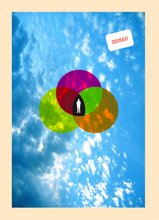 El grupo de Rock norteamericano Radiohead decidió adoptar las reglas del juego que dominan hace algún tiempo la industria de la música y lanzo un nuevo álbum que abraza la filosofía del “todo gratis” – o casi todo.
El grupo de Rock norteamericano Radiohead decidió adoptar las reglas del juego que dominan hace algún tiempo la industria de la música y lanzo un nuevo álbum que abraza la filosofía del “todo gratis” – o casi todo.También conocido como “Pay-as-you-can experiment”, el jugado proyecto del grupo parece andar bien y según dice el vocero de la banda, “La mayoría de las personas ofrecen un precio normal de compra y solamente algunos tratan de comprarlo por un centavo”.

Su nuevo “record-label-free” álbum Inrainbows puede ser adquirido en la página de la banda y cuenta actualmente con dos versiones distintas. La alternativa más completa llamada “disc-box” es entregada por correo y trae un libro completo, dos CD’s, copias en vinilo, más canciones y un ringtone de Thom Yorke aullando como un gato lastimado. La otra consiste simplemente en hacer el download de las canciones en formato digital, al mejor estilo iTunes o eMule.
Los fans de la banda no perdieron tiempo y ya están realizando sus pedidos por adelantado, pagando un promedio de $80 dólares por la versión más completas del álbum.

Serán los conciertos “pague lo que quiera” el próximo paso de esta gira 2.0?
Fuente: Wired





1 comment:
It's no exaggeration to say the music industry is eagerly awaiting the results of Radiohead's decision to let consumers decide how much, if anything, to pay for the group's latest album.
And it's probably fair to speculate that many executives are hoping that the group finds it can't make as much money with their pay-what-you-choose pricing plan as it could have, had it sold "In Rainbows" through a record label.
Now, preliminary results in from comScore show that about six in 10 downloaders didn't pay anything for the album since it was made available online on Oct. 10. Worldwide, 1.2 million people visited the album's Web site last month, with a "significant percentage" downloading the record, according to comScore estimates.
Thirty-eight percent of downloaders worldwide paid something for the album, while 62% downloaded it for free. Paying downloaders forked over an average of $6, with U.S. consumers paying almost twice as much ($8.05) as those from other countries ($4.64).
Between the "freeloaders" and paying downloaders, overall revenue came to an average $2.26 per album.
But many questions need to be answered before any conclusions can be drawn from that figure. Among the most significant is, how many of those early downloaders only did so because the tracks were free? If the freeloaders wouldn't have purchased the record under any circumstances, it doesn't bode poorly for musicians that they chose not to pay here.
Consider also, bands typically receive only a small portion of the purchase price when their record labels sell the albums. While precise details of arrangement between Radiohead and its label aren't known, music attorney and record exec Chris Castle estimated to CNET that the group saw between $3 and $5 per album sold by their label and tended to sell 3 million to 4 million copies of each album.
Meantime, before anyone deems Radiohead's initiative an economic failure based on just three weeks worth of data, the industry should consider the intangible factors -- including goodwill from consumers -- that could translate into ticket sales or other revenue down the line.
Post a Comment